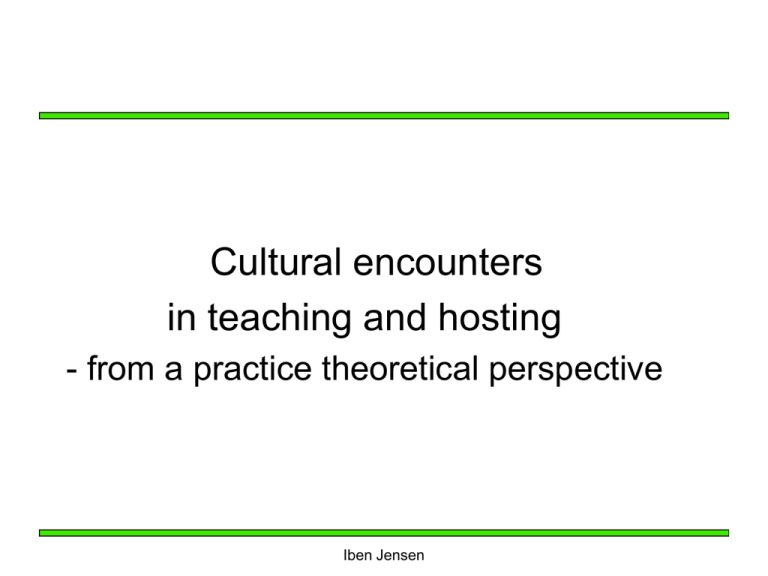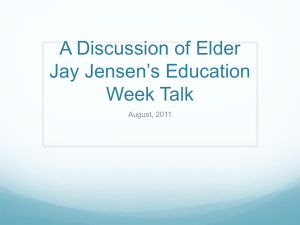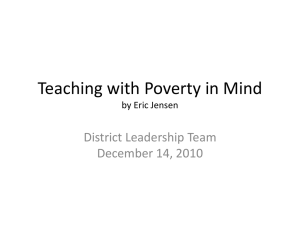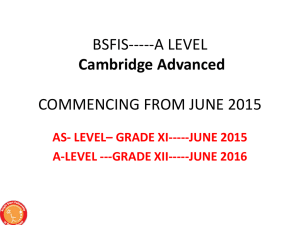Jensen
advertisement

Cultural encounters in teaching and hosting - from a practice theoretical perspective Iben Jensen Plan • What is a practice theoretical perspective? • Problembased project work as a practice • Positioning as part of practice an relations • Hosting as a practice • Focusing on practices … Iben Jensen A practice theoretical perspective • A perspective which foregrounds practice focusing on doings and sayings - seeing practices as social organising in society. • The social is in the practice. • Bourdieu, Giddens, Butler, Garfinkel, Foucault, Latour Iben Jensen Practice theories • Philosophical: Theodore Schatzki (Doings and sayings) • Cultural theoretical: Andreas Reckwitz (The social is in practice) • Sociological: Ann Swidler (Anchoring of practice: Gay parades) • Consumption: Allan Warde, Elisabeth Shove (Old cars and Nordic walking) Iben Jensen 3 core assumptions • Practices are routinized bodily activities. A social practice is the product of training the body in a certain way. • Every agent carries out a multitude of different social practices. • Appropriate performance: Practice is negotiated with the categories represented by the actors. Iben Jensen Analysis of practice • Understanding (preunderstanding, knowledge): Teachers and students expectations • Procedures (formal and informal rules): How do you act in class? Which relations are legal? • Engagements (performances): How does teacher and students show their interest? Iben Jensen Data: International education • 3 interviews with ’foreign’ students (2002) 1 interview with a supervisor (2002) • 10 interviews with ’foreign’ students (2004) • 5 interviews with groups of ’foreign’ students • 3 interviews with adminstrators and supervisors (2008) Iben Jensen Problembased groupwork “– I don’t know what is normal, but at first it is very difficult to get something solid from them. So I just shooting questions. And they said: ”year you have to find out for yourself – you have to take your own decision” I said: Is this good – or is this better? and they said: “You have to find out for yourselves”. It is a little confusing and I think it slows down the process.” Iben Jensen As a practice • Understandings: The teachers does not give a solid answer • Procedures: ”You have to find out for your self”. ”You have to take your own decision” • Engagement: Hidden agenda: Be independent and solve the puzzle: our practice Iben Jensen Positioning (and relations) • A superior position (might be expected from the teacher) • An equal position (often an ideal in problembased education) • A inferiour position (often taken by students) Iben Jensen ”Very little Chinese students will tell the teacher to slow down with overheads, If I can not follow, I will work harder, work harder … Because in China, if you can not get the things it is your problem, not the teacher’s problem, so we can not complain to the teacher, but we must change ourselves I: Is it not possible to change the teacher? I don’t think so – I have never thought about it … no that’s true (2002) Iben Jensen Hosting “I mean you can not, you have at nine o’ clock at the morning and in the beginning of the semester everybody goes partying every day, because everybody does it you have free of everything no parents no nothing, go out and party every day.” Iben Jensen Accomodation • “No I went to say, I pay a lot of money for me for this accommodation and something appeared in my room and it’s not healthy for me to live in such an environment, it´s always wet. He just gave me a paper in which it was stated that the climate in Denmark is very difficult and things like that could appear, I still have the paper, so the climate is that I should open the window more and I said it´s February for me it´s very cold here in Denmark, I can not sleep with the door open. Then he came and inspected the room, and he asked me again: “You have just showered and you don´t open the window?”, because it was very very wet, and I said: “No I showered last night, this is morning”, if I left the window something would …. Iben Jensen Focusing on practice • Avoids cultural expectation of national differences – focuses on teaching in ’an unknown project based method’ • Contributes to teaching in own practice, our own expectations and gives us an opportunity to let the foreign students ask about our local teaching practice. Iben Jensen • Focusing on hosting as a practice is an opportunity to discuss • Understanidng (eg. of accomodations) • Procedures (formal and informal rules) • Engagements (How do you perform, when you are frustrated and far from home?) Iben Jensen References • • • • • • • • Bourdieu P (1990). The Logic of Practice. Cambridge, Polity. Butler J (1990). Gender Trouble: Feminism and the Subversion of Identity. New York. Foucault, M (1978). The History of Sexuality. Vol.1. Harmondsworth, Penguin. Garfinkel H (1967). Studies in Ethnomethodology. New Jersey, Prentice Hall Inc. Giddens A (1984). The Constitution of Society. Cambridge, Polity Press. Harré R and Langenhove Lv (1999). Positioning theory. Oxford, Blackwell. Jensen I (2007). “The Aspect of Power in Intercultural Communication Practice", in Dahl, Jensen and Nynäs (eds.): Bridges of Understanding Perspectives on Intercultural Communication, A Reader. Oslo, Academic Press. Latour B (1993). We have Never been Modern. Cambridge Mass., Harvard University Press. Iben Jensen Referencer – Reckwitz A (2002). Toward a Theory of Social Practices. A Development in Culturalist Theorizing. European Journal of Social Theory, 5 (2). – Schatzki T (1996). Social Practices. A Wittgensteinian Approach to Human Activity and the Social. Cambridge, Cambridge University Press. – Schatzki T K Knorr-Cetina and E von Savigny (eds): The Practice Turn in Contemporary Theory. London, Routledge. – Schatzki T (2002). The site of the social – a philosophical account of the constitution of social life and change. The Pennsylvania state university press. – Warde A (2005). Consumption and Theories of Practice. Journal of Consumer Culture, 5 (2). – West C and Zimmerman D H (1987). Doing Gender. Gender and Society, 1 (2). Iben Jensen









